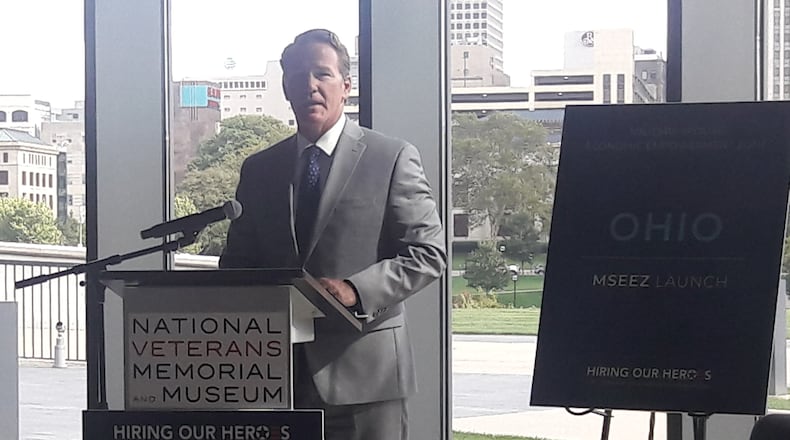But only in recent years have there been effective efforts to address that issue, he said.
“The military spouse community has been plagued by an unemployment rate of 20% for decades,” Alvarado said.
That is exacerbated by an underemployment rate of more than 70%, as spouses often take jobs below their skill level due to frequent moves, lack of childcare and sparse opportunities in many places, he said.
Lt. Gov. Jon Husted said the MSEEZ initiative has three pillars: “hire, train and navigate.”
That means connecting military spouses with potential employers, providing training to meet those companies’ needs, and creating community networks to find local solutions to employment-related issues.
Jobs for military spouses are of special importance in the Dayton area due to the presence of Wright-Patterson Air Force Base, which with more than 30,000 military and civilian employees is the largest single-site employer in Ohio.
“This is something we already locally understand, but this is a statewide initiative coming from top,” said Jeff Hoagland, president and CEO of the Dayton Development Coalition. Hoagland did not attend the Columbus announcement but commented afterward.
Government and military-related jobs are a growth sector in Ohio, he said.
“It’s no surprise that Ohio is getting more recognition for its military-friendly status, especially around spouses, because (state officials) have been laser focused these last two or three years in this effort,” Hoagland said.
One result of that focus is Senate Bill 7, which Gov. Mike DeWine signed in January 2020. It requires state occupational licensing agencies to issue temporary licenses or certificates to uniformed service members and spouses who are validly licensed in another jurisdiction and have moved to Ohio for military duty. That is something Wright-Patt representatives sought for years.
Husted touted SB 7 as a game-changer.
“More and more today, many people have a career that depends on a license,” he said.
It creates unnecessary difficulties for military spouses, whether they’re trained as teachers, real estate agents, healthcare workers or other licensed professions, if they have to reapply for certification in a different state every few years, Husted said.
Credit: Jim Gaines
Credit: Jim Gaines
In September, the Department of the Air Force ranked Ohio in the middle tier of states for support of military families. State officials asked the Air Force to revisit that ranking, especially in light of SB 7.
In June 2020 DeWine also signed House Bill 16, which automatically gives students from families at Wright-Patt in-state college tuition.
Colleen Briggs, a co-chair of the Ohio MSEEZ leadership team and an operations manager for Amazon, said when she moved to Ohio 12 years ago with her active-duty husband, she struggled to overcome gaps in her resume and a need for childcare when she looked for a good job.
Several other spouses of military members told of similar difficulties, but said people like themselves had many skills to offer and a drive to succeed.
About the Author


